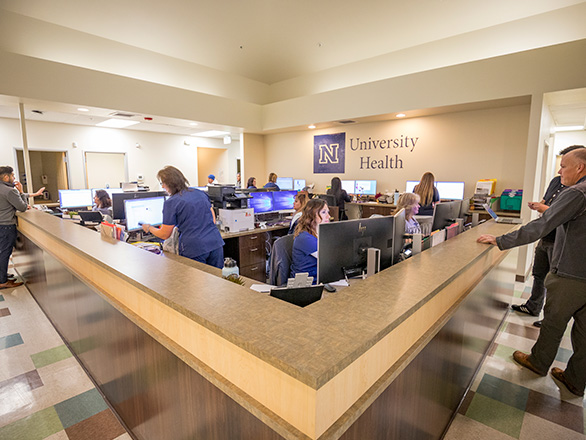Engaging students in the pursuit of clinical excellence as lifelong learners through leadership, communication and teamwork and to support faculty in the development, delivery and evaluation of the curriculum.
An outstanding medical education
The University of Nevada, Reno School of Medicine offers an outstanding medical education program in which students are actively engaged in the learning process from matriculation to graduation.

Years 1 and 2
The first two years of the M.D. program are concentrated in the classrooms, laboratories and clinical settings on the University of Nevada, Reno campus. The curriculum emphasizes the biomedical and behavioral sciences basic and foundational to the practice of medicine. Basic science disciplines are integrated with each other and with clinical problems to promote the learning of problem-solving skills.

Years 3 and 4
The third and fourth years emphasize a balance of ambulatory and inpatient medical education designed to prepare students for residency training and beyond. Third and fourth year students study clinical medicine in Reno, Las Vegas, and rural Nevada.
The Office of Medical Education is responsible for implementing a comprehensive institutional assessment plan for the undergraduate medical education program. This plan includes evaluation of the curriculum for the M.D. degree program through data collection from our internal and external stakeholders. These efforts help us, as an institution, to monitor our progress in meeting the institutional objectives we have established for the University of Nevada, Reno School of Medicine and to inform decision-making for continuous quality improvement of our M.D. degree program.
Students
Students regularly evaluate the courses they take and the teaching provided by our faculty. Feedback from students plays an important role in informing the Office of Medical Education and our faculty regarding the quality of the educational experience our students receive.
Beginning in Year 1, students are required to evaluate our curriculum through an on-line data collection system called One45. Students are also required to occasionally participate in focus group sessions designed to evaluate specific aspects of our curriculum.
All data collected from students regarding the curriculum and faculty teaching efforts is maintained in a highly secure database and reported anonymously and only in an aggregated format. Completing course and teaching evaluations in a timely and professional manner is expected of all University of Nevada, Reno School of Medicine students, and is an aspect of professionalism of which our students are evaluated.
Please email Cherie Singer or complete the Global Assessment of Student Professionalism online form which clearly outlines our institutional expectations of all Medical Students.
Faculty
Faculty regularly assess student learning through internal and external exams, writing assignments, small group work, observed patient encounters, and simulated patient activities.
Faculty teaching efforts are evaluated in all four years of the M.D. degree program by our students. Individual faculty members receive teaching evaluation summary reports from the Office of Medical Education for each level of medical student with which those faculty members interact in the curriculum.
Department chairs receive a copy of these annual teaching evaluation reports in early January.
Year 1-2 block directors receive student evaluation data reports within four to six weeks following the conclusion of their block.
Year 3 clerkship directors receive biannual clerkship reports in January and August. Elective evaluation data is only reported on an annual basis due to anonymity concerns.
Institutional Assessment
At the end of the first year of residency the Office of Medical Education surveys graduates of our M.D. degree program about their satisfaction with learning experiences in our curriculum and their satisfaction with residency programs they match into.
We also survey the residency program directors annually to gather information from a faculty perspective regarding how well prepared for residency our graduates were. The data collected from these two surveys are reported back to the University of Nevada, Reno School of Medicine Medical Education Steering Committee.